
Why Annual Check-ups Are Crucial for Your Dog
We all wish our beloved dogs could tell us exactly how they're feeling. While they can't communicate their health concerns directly, regular veterinary check-ups can help us detect and prevent potential health issues early. Let's explore why annual check-ups are so essential for your furry friend's wellbeing.
Prevention Is Better Than CureJust like human health check-ups, regular veterinary visits are a vital part of responsible pet ownership. Through annual examinations, your vet can:
- Assess your dog's overall health status
- Detect potential health concerns early
- Create personalized preventive care plans
What Does an Annual Check-up Include?
1. Vaccinations and Boosters
Regular vaccinations protect against numerous dangerous infectious diseases. Your veterinarian will develop an appropriate vaccination schedule based on your dog's age, lifestyle, and health condition.
2. Dental Examination
Many pet owners overlook their dog's oral health. In fact, dental and gum problems can affect not only eating but may lead to other health issues. Regular dental checks and cleaning can:
- Prevent periodontal disease
- Detect oral tumors early
- Maintain oral hygiene and prevent bad breath
3. Routine Blood Work
Especially important for senior dogs, regular blood tests can help:
- Check organ functions
- Detect chronic diseases early
- Evaluate overall health status
Cost-Effectiveness
While regular check-ups might seem like an additional expense, they're actually a smart investment in the long run:
- Early detection of health issues reduces treatment costs
- Preventive checks are much cheaper than emergency treatments
- They can extend your dog's lifespan and improve quality of life
How to Schedule Check-ups?
- Choose a regular veterinary clinic to establish a long-term relationship
- Discuss appropriate check-up frequency with your vet based on your dog's age and health status
- Maintain good medical records, including vaccination dates and examination results
- Monitor your dog's daily condition and seek medical attention if anything seems unusual
Tips for Making the Most of Your Vet Visit
Before the Visit:
- Keep track of any changes in your dog's behavior or health
- Write down any questions you want to ask
- Bring your dog's previous medical records if visiting a new vet
During the Visit:
- Share all relevant information about your dog's daily routine
- Don't hesitate to ask questions about concerns
- Take notes on the vet's recommendations
Financial Planning for Pet Healthcare
Consider these options to manage veterinary costs:
- Pet insurance plans
- Wellness packages offered by veterinary clinics
- Setting aside a monthly amount for pet healthcare
As dog owners, we're responsible for ensuring our pets live healthy, happy lives. Regular check-ups provide the best preventive healthcare possible for our furry friends. Remember, prevention is always better than cure. Start planning your dog's regular check-up schedule today!
This annual commitment to your dog's health will not only give you peace of mind but also help ensure many joyful years together with your beloved pet. After all, our dogs give us their best every day – they deserve the same in return through proper medical care and attention.
Additional Resources:
Physical Exercise Toys
1. Interactive Fetch Toys
- Tennis balls and ball launchers
- Frisbees for outdoor play
- Floating toys for water play
- Bounce-back toys for solo play
2. Tug-of-War Toys
- Rope toys (different sizes and textures)
- Durable rubber pull toys
- Reinforced fabric toys
- Safety-grip handles for owners
Mental Stimulation Toys
1. Puzzle Toys
- Treat-dispensing puzzles
- Hide-and-seek toys
- Interactive food mazes
- Sliding puzzle games
2. Treat-Dispensing Toys
- KONG classics (can be filled with treats)
- Slow-feeder balls
- Wobble toys
- Snuffle mats for foraging
Dental Health Toys
1. Chewing Toys
- Dental chew toys with ridges
- Nylon bones
- Natural rubber toys
- Rope toys with dental benefits
2. Durable Chewers
- Heavy-duty rubber toys
- Textured chew toys
- Dental cleaning balls
- Ice toys for teething relief
Safety Tips for Toy Selection
- Size Appropriate
- Choose toys that match your dog's size
- Avoid toys that could be swallowed
- Replace worn-out toys promptly
- Material Safety
- Non-toxic materials only
- Avoid toys with small parts
- Check for durability
- Regular inspection for wear and tear
Activity Ideas
1. Indoor Activities
- Hide and seek games
- Stair exercises (supervised)
- Indoor obstacle courses
- Training sessions with toys
2. Outdoor Adventures
- Agility training
- Swimming
- Hiking
- Dog park visits
Benefits of Regular Play
- Physical Health
- Maintains healthy weight
- Improves cardiovascular health
- Strengthens muscles
- Enhances coordination
- Mental Stimulation
- Prevents boredom
- Reduces anxiety
- Improves problem-solving skills
- Strengthens bond with owner
Rotating Toy Schedule
Create a toy rotation system to:
- Keep your dog interested
- Extend toy lifespan
- Provide variety in play
- Monitor toy condition
Special Considerations
1. Age-Specific Needs
- Puppy teething toys
- Adult dog durability
- Senior dog comfort toys
2. Breed-Specific Recommendations
- High-energy breeds: more challenging toys
- Intelligent breeds: complex puzzles
- Small breeds: appropriately sized toys
- Large breeds: durable options
Remember to:
- Always supervise playtime
- Clean toys regularly
- Replace damaged toys
- Rotate toys to maintain interest
- Match toys to your dog's play style and energy level











 https://ri-son.com
https://ri-son.com







